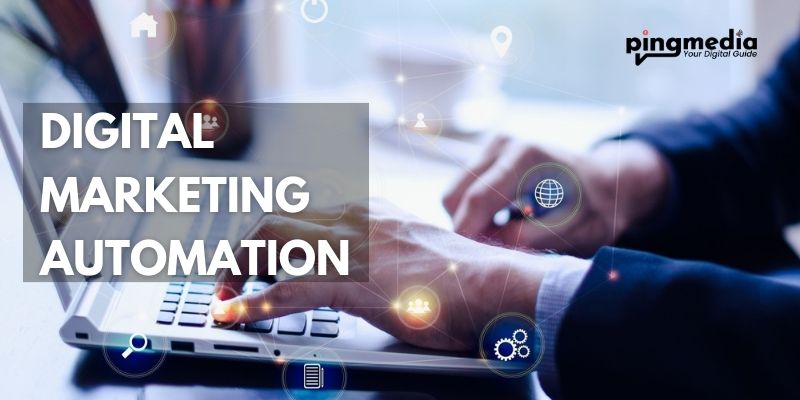
Introduction
What Is Digital Marketing Automation? In the fast-evolving realm of digital marketing, staying competitive demands more than just creativity and compelling content. It requires a strategic approach that optimizes resources and enhances customer engagement. This is where Digital Marketing Automation steps in, a transformative tool that’s revolutionizing the way businesses connect with their audience and drive results.
Defining Digital Marketing Automation
Let’s begin by unraveling the essence of Digital Marketing Automation. At its core, it represents a sophisticated blend of technology and strategy, aimed at automating repetitive marketing tasks and processes. This automation enables businesses to streamline their operations, reach their target audience with personalized content, and optimize their marketing strategies for maximum efficiency and effectiveness.
The Key Components Digital Marketing Automation
To fully grasp the concept, it’s essential to dissect the core components that constitute Digital Marketing Automation:
1. Data Integration
At the heart of every successful automation strategy lies the integration of diverse data sources. This includes customer demographics, behaviors, and interactions across various touchpoints. By consolidating this data, businesses can gain profound insights into their audience, driving more informed decisions.
2. Workflow Automation
This component enables the automation of repetitive marketing tasks, such as email campaigns, social media posting, and lead nurturing. It ensures that messages are delivered to the right audience at the right time, all without manual intervention.
3. Personalization Engines
Personalization is the lifeblood of modern marketing. Digital Marketing Automation leverages advanced algorithms and machine learning to deliver personalized content to individual users, enhancing customer engagement and loyalty.
4. Analytics and Reporting
Effective marketing requires continuous optimization. Automation platforms provide in-depth analytics, enabling marketers to measure campaign performance, identify trends, and refine strategies for better results.
The Pain Points Addressed Digital Marketing Automation
Now that we’ve explored the fundamentals, let’s delve into the pain points that Digital Marketing Automation can address:
1. Overwhelmed by Repetition
Marketing teams often find themselves bogged down by repetitive tasks, from scheduling social media posts to sending out emails. This not only saps creativity but also consumes valuable time that could be better spent on strategic initiatives.
2. Missed Opportunities
In the digital age, customers expect timely and relevant interactions. Missing out on such opportunities due to manual processes can result in lost leads and revenue.
3. Data Complexity
Modern marketing relies heavily on data, but making sense of vast datasets can be daunting. Digital Marketing Automation simplifies data analysis, providing actionable insights that drive decision-making.
4. Rising Costs
Traditional marketing methods can be expensive and inefficient. Automation helps reduce costs by eliminating the need for manual labor and increasing the ROI on marketing campaigns.
5. Competitive Pressure
Staying ahead of the competition requires innovation. Brands that embrace Digital Marketing Automation gain a competitive edge by delivering superior customer experiences and more targeted marketing efforts.
The Benefits of Digital Marketing Automation
So, what tangible benefits can businesses expect to reap from Digital Marketing Automation? Let’s explore the transformative advantages:
1. Enhanced Efficiency
Automation liberates marketing teams from mundane tasks, allowing them to focus on strategic activities. This streamlined approach increases overall efficiency and productivity.
2. Improved Customer Engagement
Personalization engines enable businesses to deliver tailored content and offers to individual customers, fostering deeper connections and higher engagement rates.
3. Real-time Adaptability
With automated analytics and reporting, businesses can swiftly adjust their strategies based on real-time data, ensuring they stay agile in the dynamic digital landscape.
4. Cost Savings
Reducing manual labor not only saves time but also cuts down on operational costs, making marketing more budget-friendly.
5. Scalability
As businesses grow, their marketing efforts can scale seamlessly with automation, ensuring consistency and quality in customer interactions.
Common Applications
Now that we’ve grasped the essentials and benefits, it’s crucial to understand how Digital Marketing Automation is applied in practice:
1. Email Marketing
Automated email campaigns deliver tailored messages at optimal times, nurturing leads and driving conversions.
2. Social Media Marketing
Scheduling and automating social media posts ensure that content reaches the right audience when they’re most active.
3. Lead Generation and Nurturing
Automation streamlines the process of capturing and nurturing leads, from initial contact to conversion.
4. Customer Relationship Management (CRM)
CRM systems use automation to manage customer interactions, ensuring a seamless and personalized experience.
5. E-commerce
Automation optimizes product recommendations, cart abandonment reminders, and order confirmation emails, boosting e-commerce revenue.
Best Practices for Success
To make the most of Digital Marketing Automation, consider these best practices:
1. Start with Clear Goals
Define your objectives and desired outcomes before implementing automation. This provides direction and ensures alignment with your business objectives.
2. Segment Your Audience
Segmentation allows for more personalized and targeted messaging, increasing the relevance of your content.
3. Test and Refine
Continuous testing and optimization are crucial for success. Use A/B testing to refine your strategies and improve results over time.
4. Integrate Data Sources
To maximize the power of automation, ensure seamless integration with your data sources, including CRM systems and analytics tools.
5. Invest in Training
Empower your team with the necessary skills and knowledge to leverage automation effectively.
The Future of Digital Marketing
In a digital landscape that’s constantly evolving, Digital Marketing Automation is not just a trend; it’s a necessity. It’s the compass that guides businesses through the complexities of the digital world, enabling them to forge deeper connections with their audience and drive unparalleled results. As technology continues to advance, those who embrace automation will find themselves at the forefront of innovation and success in the ever-competitive world of digital marketing.
